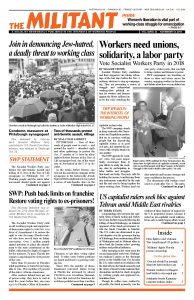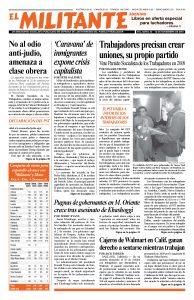The Florida prison system’s Literature Review Committee informed the Militant Oct. 24 that they had upheld the ban on the Sept. 17 issue of Militant. As usual, they didn’t give any reason for the decision, much less point to a single sentence in the paper to justify this violation of the constitutional rights of both the paper and of subscribers behind bars.
In response, the Militant is asking defenders of democratic and political rights to send letters to Florida prison officials asking them to reverse this decision and to halt the baseless ongoing impoundments.
Letters from union officials and members, church groups, community organizations, student groups and anyone who believes that workers behind bars have a right to read the material of their choosing and think for themselves are welcome.
“This is the sixth ban the Literature Review Committee has upheld in the last two years,” noted Militant editor John Studer. “While we appreciate the fact that the committee has overturned most of the impoundments, the number that are being upheld is on the rise. Not one of the bans is justified.”
Under Florida rules, if one prison impounds an issue, every other Florida prison follows suit.
Prison officials use a multiple choice form to check off their rationalizations for impounding a publication. Authorities at Florida State Prison in Raiford had checked off two boxes, claiming with no basis whatsoever that two articles in the Sept. 17 issue are a “threat to the security, good order, or discipline” of the prison and encourage “insurrection.”
One article reported on a public protest against solitary confinement in California, an issue that the Militant and many other papers have reported on frequently. The other article was on the hunger strike by Crimean movie director Oleg Sentsov, who was framed up, tortured and jailed in Siberia by the Vladimir Putin regime in Russia.
The Militant’s lawyer, David Goldstein, of the Rabinowitz, Boudin, Standard, Krinsky & Lieberman civil rights law firm, noted in his appeal of the impoundment that Florida has impounded at least 19 issues in the last year and a half “four times as many as in the entire rest of the nation, state and federal prisons combined, in the past decade.”
The Militant is not the only publication fighting censorship in Florida prisons. The Prison Legal News has been completely banned since 2009, allegedly because prison officials say they object to many of the paid ads.
Editor Paul Wright, himself a former prisoner, says the ban is in fact aimed at keeping content critical of the prison system out of the hands of inmates.
With the backing of dozens of media, free speech and prison rights organizations, Prison Legal News filed an appeal Sept. 14 asking the U.S. Supreme Court to overturn a lower court decision upholding the blanket ban.
Join the fight to end censorship of the Militant! Send letters to Dean Peterson, Library Services Administrator, Florida Department of Corrections, Attn: Literature Review Committee, 501 South Calhoun Street, Tallahassee, FL 32399-2500, and via email to Allen.Peterson@fdc.myflorida.com. Send a copy of your letter via email to themilitant@mac.com.

